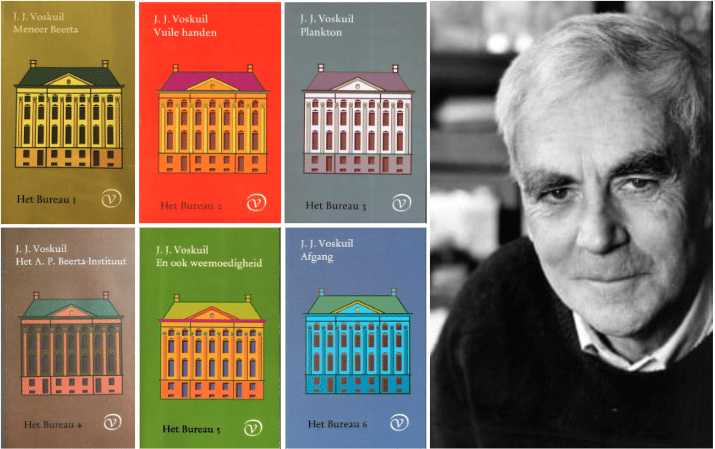Alice Tetley-Paul’s Choice: Annie M.G. Schmidt and J.J. Voskuil
Every month, a translator of
Dutch into English gives literary tips by answering two questions: which
translated book by a Flemish or Dutch author should everyone read? And, which
book deserves an English translation? To get publishers excited, an excerpt has
already been translated. Alice Tetley-Paul makes a plea for an iconic children’s book and a novel cycle that caused a minor craze in the
Netherlands.
Must-read: ‘The Cat Who Came in off the Roof’ by Annie M.G. Schmidt
 Annie M.G. Schmidt
Annie M.G. Schmidt© Wikipedia
Annie M.G. Schmidt is regarded as the Queen of Dutch Children’s Literature and The Cat Who Came in off the Roof was her favourite book. Published in 1970, it’s an absolute classic in the Netherlands, and David Colmer’s brilliant English translation was published by Pushkin in 2014. I first became acquainted with Annie M.G. Schmidt’s work many years ago thanks to Jip and Janneke, a series of stories following the adventures of two preschoolers, which I now enjoy sharing with my own preschooler. The Cat Who Came in off the Roof is aimed at slightly older readers (aged 8-12), but this quirky, humorous story can be enjoyed by cat lovers of any age.
The book is about a reporter called Tibble, who is too shy to gather real news and only ever writes about cats. After an ultimatum from his boss, Tibble has one last chance to come up with some real news, or he’ll lose his job. That’s when he meets Minou, who comes in off the roof after being chased up a tree by a dog. Minou used to be a cat, but finds herself transformed into a human. Tibble takes her in and starts noticing her bizarre cattish traits, such as the way she sleeps in a box, lies in wait at a mouse hole and rubs up against people she likes (she has a particular soft spot for the fishmonger!). Fortunately for Tibble, she retains the ability to talk to cats and humans, and provides interesting leads for news stories.
This is an original, funny, feel-good read, where the powerless ultimately triumph over the powerful. I particularly enjoyed the humorous descriptions of Minou’s cattish behaviours, which will be familiar to anyone who has ever had a cat. I can’t wait to share it with my daughter (and, of course, our cat) very soon!
Annie M.G. Schmidt, The Cat Who Came in off the Roof, translated from the Dutch by David Colmer, Pushkin Press, 2014, 160 pages
To be translated: ‘Het Bureau’ by J.J. Voskuil
 J.J. Voskuil
J.J. Voskuil© Van Oorschot
Het Bureau is a seven-part, 5500-page novel cycle written by J.J. Voskuil that meticulously describes thirty years in the existence of office worker Maarten Koning. The novels are based on Voskuil’s own experiences working at the Meertens Institute, which studies language and culture in the Netherlands. The series was a real literary sensation in the Netherlands; people would rush to bookshops to get their hands on the latest volume and the office that inspired the series was even opened up to the public for tours.
The first volume begins in 1957 when Koning is given a job at the A.P. Beerta Institute, where his role is to research obscure folk traditions such as the belief in elves. No one knows what purpose the research is intended to serve, but everyone does as they are told, and the sense of pointlessness builds up to such an extent that it forces us to consider the pointlessness of our own existence. Maarten’s life at home and in the office is depicted painstakingly, with plenty of dry humour and absurdist, repetitive dialogues that come together to create a hypnotic effect.
The German translation (by Gerd Busse) of the entire Het Bureau
cycle has been well-received and I think the series deserves a spot on bookshelves in English-speaking homes too, perhaps alongside Karl Ove Knausgaard’s six-volume My Struggle
(translated by Don Bartlett).
J.J. Voskuil, Het Bureau 1, 2, 3, 4, 5, 6 & 7, Van Oorschot, 1996-2000, 5188 pages
Excerpt from ‘Het Bureau I: Meneer Beerta’, translated by Alice Tetley-Paul
The kitchen door was closed. Nicolien was in the kitchen. He put the tape recorder down on the stool, flung his jacket over the sofa, took the cloth case containing the microphone out of his bag and sat down on the sofa, pulling the stool towards him. He lifted up the tape recorder’s lid, took the microphone out of its case, inserted the power cord into the jack and stood up to plug in the other end at the wall. After sitting down again, he pressed the black and red buttons and the green light came on. The tape had just started to turn when the kitchen door opened. Nicolien walked through the back room towards him. “Why didn’t you say hello?” At precisely that moment, she saw the tape recorder and stopped where she was, in the doorway between the rooms. “What have you got there?” she asked suspiciously.
“Hang on a moment!” He adjusted the volume controller.
“That’s not a tape recorder, is it?” she barked.
He looked up and laughed uncertainly.
“It is a tape recorder, isn’t it?” she repeated.
“Yes.” He felt rotten. It was just then that she noticed the tape was turning. “It’s not recording, is it?” He saw the green bars rise with the power of her voice. “Don’t shout like that,” he warned her.
“Turn that thing off!” she yelled. She walked towards the table.
“Turn it off!”
“Why?” He was scared she was going to fling the piece of equipment off the stool, and got ready to protect it.
“Because I say so. Because I don’t want that damn thing in my house! Turn it off! I’m telling you.” She was beside herself.
Reluctantly, he turned it off. “For God’s sake,” he said, feeling fed up.
“How the hell do you come up with the idea of recording me in secret? In my own
home! Without saying a word about it. How do you come up with these things?”
“It wasn’t in secret,” he said, starting to get angry now as well. “I just wanted to let you hear what your voice sounds like! I thought you’d like it!”
“Like it?” she yelled. “Like it? Do you not know me at all? Do you not know, after sixteen years, that I don’t want junk like that in my home? It’s bad enough that you’re using it at work! But at home as well. What were you thinking?”
“I’ve got to go to Marken tomorrow.” He felt cornered by the force of her rage.
“Marken? And you couldn’t have just left it at the office? Surely you could have called in on your way and picked it up instead of bringing the damn thing home with you? I don’t want this technology! I don’t want this piece of junk in my house. It’s one thing using it at work. But bringing it home as well!”
“I have to practise using it.”
“Practise at work then!”
“I couldn’t, because I only found out at the end of the day. Beerta arranged it.”
“Then don’t bother! Just go, without practising. What have you got to do in Marken anyway?”
“Collect stories from fishermen.”
“And you need a tape recorder to do that?”
“Of course I need a tape recorder to do that.”
“Well, how did they use to do it then? When they didn’t have such contraptions? How did they use to do it?”
He shrugged his shoulders.
“How did they use to do it?” she repeated, this time threateningly.
“They didn’t use to do it,” he snapped.






